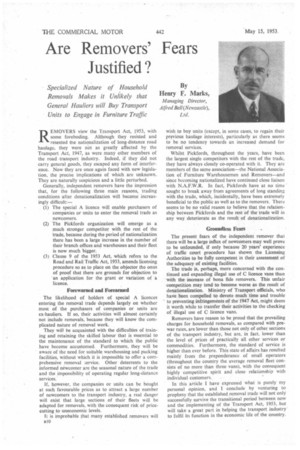Are Removers' Fears Justified?
Page 44

If you've noticed an error in this article please click here to report it so we can fix it.
By Henry F. Marks,
REMOVERS view the Transport Act, 1953, with some foreboding. Although they resisted and resented the nationalization of long-distance road haulage, they were not as greatly affected by the Transport Act, 1947, as were many other members of the road transport industry. Indeed, if they did not carry general goods, they escaped any form of interference. Now they are once again faced with new legislation, the precise implications of which are unknown. They are naturally suspicious and a little perturbed.
Generally, independent removers have the impression that, for the following three main reasons, trading conditions after denationalization will become increasingly difficult:— (1) The special A licence will enable purchasers of companies or units to enter the removal trade as newcomers.
(2) The Pickfords organization will emerge as a much stronger competitor with the rest of the trade, because during the period of nationalization there has been a large increase in the number of their branch offices and warehouses and their fleet is now much bigger.
(3) Clause 9 of the 1953 Act, which refers to the Road and Rail Traffic Act, 1933, amends licensing procedure so as to place on the objector the onus of proof that there are grounds for objection to an application for the grant or variation of a licence.
Forewarned and Forearmed
The likelihood of holders of special A licences entering the removal trade depends largely on whether most of the purchasers of companies or units are ex-hauliers. If so, their activities will almost certainly not include removals, because they will know the complicated nature of removal work.
They will be acquainted with the difficulties of training and retaining the skilled labour that is essential to the maintenance of the standard to which the public have become accustomed. Furthermore, they will be aware of the need for suitable warehousing and packing facilities, without which it is impossible to offer a comprehensive removal service. Other deterrents to the informed newcomer are the seasonal nature of the trade and the impossibility of operating regular long-distance services.
If, however, the companies or units can be bought at such favourable prices as to attract a large number of newcomers to the transport industry, a real danger will exist that large sections of their fleets will be adapted for removals, with the consequent risk of pricecutting to uneconomic levels.
It is improbable that many established removers will B I 0 wish to buy units (except, in some cases, to regain their previous haulage interests), particularly as there seems to be no tendency towards an increased demand for removal services.
Whilst Pickfords, throughout the years, have been the largest single competitors with the rest of the trade, they have always closely co-operated with it. They are members of the same association—the National Association of Furniture Warehousemen and Removers—and since becoming nationalized have continued close liaison with N.A.F.W.R. In fact, Pickfords have at no time ' sought to break away from agreements of long standing with the trade, which, incidentally, have been extremely beneficial to the public as well as to the removers. There seems to be no valid reason to believe that the relationship between Pickfords and the rest of the trade will in any way deteriorate as the result of denationalization.
Groundless Fears
The present fears of the independent remover that there will be a large influx of newcomers may well prove to be unfounded, if only because 20 years' experience of traffic court procedure has shown the Licensing Authorities to be fully competent in their assessment of the adequacy of existing facilities.
The trade is, perhaps, more concerned with the continued and expanding illegal use of C licence vans than with the increase of bona fide removers. This unfair competition may tend to become worse as the result of denationalization. Ministry of Transport officials, who have been compelled to devote much time and trouble to preventing infringements of the 1947 Act, might deem it worth while to transfer their activities to the checking of illegal use of C licence vans.
Removers have reason to be proud that the prevailing charges for household removals, as compared with prewar rates, are lower than those not only of other sections of the transport industry, but are, in fact, lower than the level of prices of practically all other services or commodities. Furthermore, the standard of service is higher than ever before. This state of affairs has resulted mainly from the preponderance of small operators (throughout the country the average removal fleet consists of no more than three vans), with the consequent highly competitive spirit and close relationship with individual customers.
In this article I have expressed what is purely my personal opinion, and I conclude by venturing to prophesy that the established removal trade will not only successfully survive the transitional period between now and the implementing of the Transport Act, 1953, but will take a great part in helping the transport industry to fulfil its function in the economic life of the country.




























































































